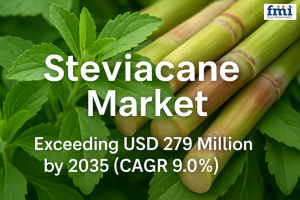Global Steviacane Market to Surpass USD 279 Million by 2035 Amid Growing Demand for Natural Sweeteners | FMI
The Steviacane market is experiencing steady growth, driven by rising demand for natural, low-calorie sweeteners in the food and beverage industry.
As awareness of sugar-related health risks grows, consumers are increasingly shifting toward low-calorie and zero-sugar products. This change in dietary habits has created fertile ground for steviacane—a blend of stevia and cane sugar—which offers the sweetness of sugar with significantly fewer calories. With its natural origin and reduced glycemic impact, steviacane appeals to health-conscious consumers who want to enjoy sweet foods without compromising their nutritional goals.
Stay Informed – Request a Sample Copy for Exclusive Insights: https://www.futuremarketinsights.com/reports/sample/rep-gb-18694
Increasing Adoption of Natural Low-Calorie Sweeteners Drives Market Growth
The global steviacane market is witnessing significant traction, driven by a growing demand for natural sweetening agents that align with evolving dietary preferences. Consumers are increasingly seeking alternatives to traditional sugar that offer both health benefits and natural origins. Steviacane, a unique blend of stevia and cane sugar, is emerging as a preferred option due to its low glycemic index, reduced calorie content, and clean-label appeal.
According to a recent market study, the global steviacane market outlook remains optimistic, with double-digit growth anticipated over the next decade. This surge is largely attributed to the ingredient's versatile applications in reduced calorie food ingredients, especially within the food and beverage industry.
Clean-Label and Functional Sweeteners Dominate Consumer Trends
With a strong inclination toward wellness-oriented sweeteners, consumers are increasingly reading labels and opting for non-GMO sweetener options that contribute to healthier lifestyles. Steviacane, which offers about 50% fewer calories than traditional sugar while maintaining a similar taste profile, is being widely adopted by manufacturers focused on functional sweeteners market trends.
The ingredient supports the development of low-calorie, clean-label products, particularly in sectors such as baked goods, dairy products, confectionery, and beverages. Its ability to deliver taste without compromise makes it a strategic component in sugar reduction solutions across multiple product lines.
Industry Developments and Innovation
To cater to the rising demand, manufacturers are ramping up production capacities and expanding their product portfolios. Innovation in blending techniques and better shelf-life stability are helping manufacturers meet stringent quality and safety standards.
Several producers are also forging partnerships with food and beverage giants to co-develop custom formulations. These collaborations aim to enhance flavor profiles while ensuring reduced calorie content, making steviacane a go-to ingredient in product reformulation projects.
Your Competitive Advantage Starts Here – Access Full Report: https://www.futuremarketinsights.com/reports/steviacane-market
Energy Storage System Market Set for 5.2% CAGR Growth as Grid Reliability & Sustainability Drive Demand
BCYW Foundation - Doon University Breast Health Awareness Event to Protect Young Adults from Breast Cancer Tomorrow
CMS Financial Earns 2025-2026 Great Place To Work Certification™
Więcej ważnych informacji
 Jedynka Newserii
Jedynka Newserii

 Jedynka Newserii
Jedynka Newserii

Farmacja

Nowy pakiet farmaceutyczny ma wyrównać szanse pacjentów w całej Unii. W Polsce na niektóre leki czeka się ponad dwa lata dłużej niż w Niemczech
Jeszcze pod przewodnictwem Polski Rada UE uzgodniła stanowisko w sprawie pakietu farmaceutycznego – największej reformy prawa lekowego od 20 lat. Ma on skrócić różnice w dostępie do terapii między krajami członkowskimi, które dziś sięgają nawet dwóch–trzech lat. W Unii Europejskiej wciąż brakuje terapii na ponad 6 tys. chorób rzadkich, a niedobory obejmują również leki ratujące życie. Nowe przepisy mają zapewnić szybszy dostęp do leków, wzmocnić konkurencyjność branży oraz zabezpieczyć dostawy.
Handel
Wzrost wydobycia ropy naftowej nie wpłynie na spadek cen surowca. Kierowcy jesienią zapłacą więcej za olej napędowy

Sierpień jest trzecim z rzędu miesiącem, gdy osiem krajów OPEC+ zwiększa podaż ropy naftowej na globalnym rynku; we wrześniu nastąpi kolejna zwyżka. Kraje OPEC, zwłaszcza Arabia Saudyjska, chcą w ten sposób odzyskać udziały w rynku utracone na skutek zmniejszenia wydobycia od 2022 roku, głównie na rzecz amerykańskich producentów. Nie należy się jednak spodziewać spadku cen ropy, gdyż popyt powinien być wysoki, a pod znakiem zapytania stoi dostępność ropy z Rosji. Nie zmienia to faktu, że jesienią ceny paliw na stacjach zazwyczaj rosną, a w największym stopniu podwyżki dotyczyć będą diesla.
Nauka
Szacowanie rzeczywistej liczby użytkowników miast dużym wyzwaniem. Statystycy wykorzystują dane z nowoczesnych źródeł

Różnica między liczbą rezydentów a rzeczywistą liczbą osób codziennie przebywających w Warszawie może sięgać nawet niemal pół miliona. Rozbieżności są dostrzegalne przede wszystkim w dużych miastach i ich obszarach funkcjonalnych. Precyzyjne dane populacyjne są tymczasem niezbędne w kształtowaniu usług społecznych i zdrowotnych, edukacyjnych, opiekuńczych, a także w planowaniu inwestycji infrastrukturalnych. W statystyce coraz częściej dane z oficjalnych źródeł, takich jak Zakład Ubezpieczeń Społecznych, są uzupełniane o te pochodzące od operatorów sieci komórkowych czy kart płatniczych.
Partner serwisu
Szkolenia

Akademia Newserii
Akademia Newserii to projekt, w ramach którego najlepsi polscy dziennikarze biznesowi, giełdowi oraz lifestylowi, a także szkoleniowcy z wieloletnim doświadczeniem dzielą się swoją wiedzą nt. pracy z mediami.









.gif)

 |
| |
| |
|